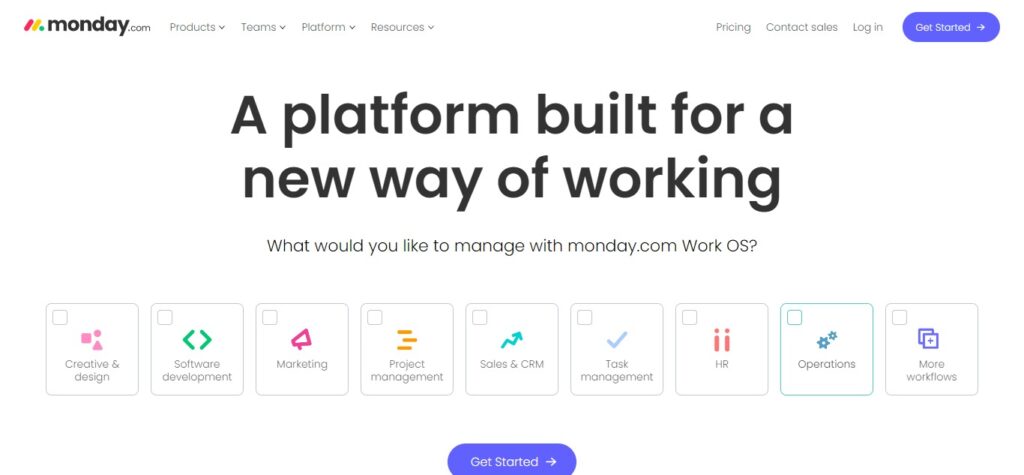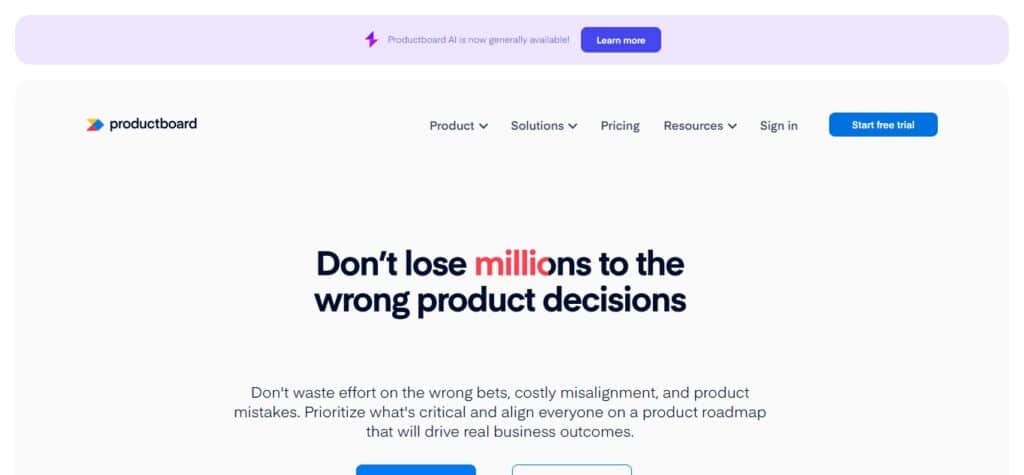Best Product Management Software for Modern Apps: Product management has become an ever-evolving field, making staying organized, collaborative, and efficient critical to its success. Businesses that wish to launch innovative products into the marketplace rely increasingly on effective product management software tools as a critical element. As there are so many choices out there promising to streamline processes and enhance team collaboration, navigating this sea of options can be difficult.
To help make things easy for you, here is our selection of 20 Best Product Management Software Solutions designed specifically for today’s world. No matter if you are an established product manager or just getting started in startups, this compilation offers tools that not only meet your individual requirements but also enable innovation, manage projects efficiently and reach business objectives. From agile development to intuitive collaboration software solutions – this compilation promises to revolutionize how product management in digital times.
How To Choose Best Product Management Software for Modern Apps?
Selecting an effective product management software requires taking an in-depth and strategic approach that takes into account both your unique requirements and challenges as a business. Navigating through all the available features and functionalities may seem a daunting challenge in an environment cluttered with options. Start the decision-making process more easily by clearly outlining your objectives, understanding team workflow and reviewing specific project requirements such as scalability, integration capabilities, user interface design and level of collaboration required.
Evaluation of software’s support for agile methodologies, analytics and customization features is of critical importance. This guide provides insights and key considerations of 20 of the best product management software solutions currently available, to enable an informed choice that aligns with organizational goals and maximizes productivity.
- Advertisement -
Here Is The List Of Best Product Management Software for Modern Apps
- Jira Software (Best Product Management Software for Modern Apps)
- Asana
- Trello
- Monday.com (Best Product Management Software for Modern Apps)
- Wrike
- ClickUp
- Aha!
- Productboard (Best Product Management Software for Modern Apps)
- Pendo
- Targetprocess
- Rally
- Craft.io (Best Product Management Software for Modern Apps)
- VersionOne
- Favro
- Planview LeanKit
- Hansoft (Best Product Management Software for Modern Apps)
- VivifyScrum
- Taiga
- Airtable
- Confluence (Best Product Management Software for Modern Apps)
20 Best Product Management Software for Modern Apps
1. Jira Software (Best Product Management Software for Modern Apps)
Jira Software stands out in product management software with a reliable, flexible platform tailored specifically for modern applications. Jira Software from Atlassian has quickly become the go-to solution for teams seeking agile project management, issue tracking, and seamless collaboration. Thanks to its adaptable nature and flexible scaleability capabilities, it makes for the ideal fit across industries and project sizes alike.

Jira Software equips product managers with features like customizable workflows, Scrum/Kanban boards and deep integration capabilities that enable them to plan, track and release high-quality software efficiently. Jira Software’s powerful reporting and analytics tools deliver invaluable insight, empowering teams to make data-driven decisions and continuously optimize development processes. Furthermore, its user-friendly interface and vast marketplace of plugins and extensions further cement its place as one of the go-to solutions for modern product management.
2. Asana
Asana stands out as one of the premier product management platforms available today, providing users with an engaging yet intuitive platform designed to facilitate collaboration, increase productivity and foster project success. Asana has quickly gained widespread adoption due to its user-friendly interface and extensive functionality. Teams find Asana invaluable as it acts as their central hub for project planning, task management and communications. Flexible workspaces, Kanban boards and Gantt charts facilitate agile methodologies and allow product managers to adapt quickly to changing requirements seamlessly.

Asana promotes transparent and efficient workflows with features such as real-time updates, file attachments and integration capabilities with popular tools – from real time updates and file attachments to integration capabilities for other popular programs like Trello – that promote streamlined operations for small teams or enterprise environments alike. Asana stands out for its focus on simplicity without compromising sophistication for modern product managers navigating software development or project management complexities.
3. Trello
Trello stands as an icon among product management software packages, boasting its visual and collaborative approach to task and project administration. Trello, acquired by Atlassian in 2014, provides an intuitive platform that appeals to diverse user types ranging from individual freelancers and small enterprises alike. Trello’s card-based system makes it possible for product managers to organize tasks, create workflows and visualize projects efficiently while remaining flexible and easily understandable.

Boasting features like boards, lists and cards – Trello provides transparency as well as seamless team collaboration across teams. Its simplicity is enhanced by its adaptability, making this software an indispensable solution for modern applications. Trello stands out as an indispensable product management solution thanks to its integration capabilities and vibrant ecosystem of Power-Ups that enhance its functionality, cementing its position as one of the premier modern options available today.
4. Monday.com (Best Product Management Software for Modern Apps)
Monday.com stands out as an innovative product management software designed for today. With features designed specifically to accommodate modern business practices and product portfolio management strategies, Monday.com stands apart as an exceptional and engaging product solution. Monday.com stands out among competing collaborative work operating systems as an adaptable, adaptable collaboration work operating system that empowers product managers to streamline workflows, track projects and enhance team collaboration. This platform uses customizable boards, columns, and automation to facilitate agile project management that caters to the varying needs of teams.

Monday.com equips product managers to stay abreast of every stage of product development with features like timelines and dependency tracking – as well as integrations with popular tools – that give them visibility and control of each aspect of development lifecycle management. Monday.com stands out with its user-friendly interface and dynamic dashboards that make it accessible for teams of any size, encouraging communication and transparency within teams of all kinds. Offering comprehensive product management software solutions geared to modern product management processes, Monday.com facilitates efficiency and innovation to support modern project development complexity.
5. Wrike
Wrike stands as an adaptive product management software designed to meet the demands of modern workflows. Renowned for its adaptability and adaptability, Wrike provides product managers with a collaborative platform allowing them to plan, organize, and execute projects successfully. Software offers powerful project management features like Gantt charts and Kanban boards with real-time collaboration tools that facilitate an streamlined product development approach.

Wrike stands out as an adaptable solution capable of supporting diverse industries and team sizes – an asset for small startups as well as established enterprises alike. Wrike offers an intuitive user experience combined with automation capabilities and customizable dashboards to optimize efficiency for product managers, helping them stay in control over every phase of their projects. Teams can leverage Wrike to navigate modern product management effectively promoting innovation while successfully completing projects on time.
6. ClickUp
ClickUp has built itself up as an innovative, all-encompassing product management software solution capable of meeting modern business challenges with innovative approaches and adaptable designs. ClickUp has become widely known for its feature-packed platform and comprehensive solution that streamlines project management, collaboration and communication within teams. ClickUp’s flexible structure allows product managers to implement Agile and Scrum methodologies, giving them more freedom in customizing workflows and dashboards to suit the unique requirements of their projects.

Software from Teamlab combines many features for product development teams, such as task management, document sharing and time tracking – in one centralized hub – that make product creation an efficient endeavor. ClickUp’s intuitive design and user-friendly interface offer users an exceptional user experience, encouraging efficiency and collaboration among teams. As an open and modern product management software solution, ClickUp makes an excellent choice for organizations seeking to navigate contemporary project management effectively with minimal difficulty and effort.
7. Aha!
Aha! is an innovative product management software known for facilitating modern product development practices and emphasizing product strategy and roadmapping. Aha! can transform the way companies view product management. Product managers benefit from an efficient platform which empowers them to engage their teams towards meeting a shared vision and meeting set objectives. Aha! Software that facilitates visual roadmaps, detailed feature planning and intuitive collaboration allows teams to prioritize tasks and make sound decisions throughout their development lifecycle.

Aha! Aha! is widely recognized for its superior integration capabilities, offering seamless connections with development tools, version control systems and collaboration platforms such as Trello or G Suite. By consolidating strategy execution communication in one centralized platform Aha! equips product managers with all of the tools required for driving innovation and creating success products in today’s fast-paced environment of product management.
8. Productboard (Best Product Management Software for Modern Apps)
Productboard stands out as a cutting-edge and user-centric product management software which caters to the constantly shifting requirements of modern product teams. Productboard’s customer-first approach empowers product managers to gather, organize, and prioritise feature ideas, user feedback, and strategic goals all on one intuitive platform. Software provides teams with a visual product management solution that makes it possible to map product roadmaps, track progress and gain an in-depth knowledge of customer requirements.

Productboard fosters cross-functional collaboration and data-driven decision making through robust features like customer insights, feedback boards and integration with popular collaboration tools. Productboard’s flexibility and scalability makes it suitable for startups as well as established enterprises, providing an efficient means of aligning product strategies with customer demands. In the highly dynamic landscape of modern product management, Productboard serves as an invaluable asset to teams aiming to develop innovative and customer-friendly products which resonate with target audiences.
9. Pendo
Pendo stands as an influential player in product management software, providing a tailored platform that prioritizes user engagement and adoption of its offerings. Pendo provides product managers with invaluable insights into user behavior, helping them make data-driven decisions throughout their product’s development lifecycle. Software provides features such as in-app messaging, user analytics and feedback collection – providing a 360deg understanding of user interaction with product.

Pendo’s ability to monitor user journeys and measure feature usage helps prioritize product upgrades according to customer demand, aligning development efforts with customer wants. Pendo serves as an indispensable strategic tool for product managers seeking to enhance user experiences, optimize feature development efforts and deliver products which stand out in today’s fiercely competitive marketplace.
10. Targetprocess
Targetprocess stands out as an adaptable and comprehensive product management software designed to address the ever-evolving nature of modern project development. Targetprocess’s flexible and adaptable platform enables product managers to easily handle even complex projects with ease. Software that integrates different project management methodologies such as Agile, Scrum and Kanban allows teams the freedom to tailor workflows according to specific project needs.

Targetprocess excels in visualizing work items, dependencies and progress for greater transparency and improved communication across cross-functional teams. Targetprocess empowers product managers with features such as customizable dashboards, analytics tools and comprehensive reporting capabilities that empower informed decisions and enable continuous process improvements for development processes. From small teams to enterprise businesses alike, Targetprocess serves as a valued ally to modern product managers seeking an adaptable project management solution tailored specifically for them.
11. Rally
Rally (formerly CA Agile Central) remains as the industry leader when it comes to product management software designed for Agile development methodologies. Rally’s commitment to Agile principles makes them a centralized platform which promotes collaboration, transparency and adaptability across teams. Rally gives product managers all of the tools needed to efficiently coordinate complex workflows and complete projects seamlessly. Features such as user story management, sprint planning and release tracking help them do this successfully.

Rally’s focus on real-time visibility into project progress combined with advanced reporting and analytics tools ensures teams can respond rapidly to changing requirements while making well-informed decisions throughout product development lifecycle. Scalable and configurable capabilities make Rally suitable for use by both small startups as well as enterprise organizations alike, cementing its place as a reliable tool for modern product managers navigating Agile project management complexities.
12. Craft.io (Best Product Management Software for Modern Apps)
Craft.io stands as an innovative product management software solution, featuring an accessible yet innovative platform designed to elevate strategic aspects of product development. Craft.io stands out for its focus on product roadmapping, giving product managers the power to develop and visualize effective product strategies. This software facilitates collaborative planning by helping teams align priorities, define product features and oversee all stages of product lifecycle without interruption.

Craft.io offers an intuitive user experience through its user-friendly interface and robust feature set – such as story mapping, idea management and release planning – providing users with an enhanced project management experience. Craft.io provides product managers with all of the tools needed to foster innovation, launch successful products quickly in an increasingly dynamic business landscape and stay ahead of competition. Through integrations, customization features and real-time collaboration tools, Craft.io gives product managers flexibility and insights that help drive innovation while simultaneously meeting product delivery deadlines in today’s fast-paced and complex environment.
13. VersionOne
VersionOne (now part of CollabNet VersionOne) provides an agile and comprehensive product management software solution specifically crafted to address Agile/DevOps practices. VersionOne’s central platform supports agile methodologies by offering collaboration, planning and execution features across complex projects. It offers users a reliable service which allows for scaling agile methodologies. Software designed for Agile project management enables project managers to manage work efficiently through features like backlog management, sprint planning and release tracking allowing product managers to efficiently plan and prioritise work.

VersionOne’s visual dashboards and reporting tools give teams real-time views into project progress, helping teams make data-driven decisions quickly and adapt to changing requirements. Thanks to its scalability and support for different Agile frameworks, VersionOne remains a go-to product management solution in today’s complex software development environments.
14. Favro
Favro is renowned as an innovative product management software designed to accommodate the complexity of contemporary project management and collaboration. Favro is an elegant combination of flexibility and functionality that meets various work styles and methodologies seamlessly. With card-based systems, customizable boards, dynamic timelines, and product managers being able to structure and visualize workflow efficiently – Favro provides product managers a versatile toolbox. Software designed to support agile methodologies allows teams to plan and oversee projects collaboratively while remaining transparent and flexible in their planning approach.

Favro provides product managers with features including backlog management, analytics and effective communication tools that enable them to streamline processes and maximize team collaboration. Perfect for both small teams or large enterprises alike, its adaptable nature and user-friendly interface make Favro an indispensable ally when it comes to project development.
15. Planview LeanKit
Planview LeanKit is an advanced product management software solution tailored to modern demands of visual project management and Lean principles. Planview LeanKit, known for its flexibility and scalability, provides product managers with a collaborative platform for organizing workflows, visualizing processes and optimizing project delivery. Kanban-style boards and cards provided by this software allow teams to track work items, identify bottlenecks and enhance efficiency continuously.

Planview LeanKit integrates seamlessly into various project management methodologies, making it suitable for teams pursuing Lean, Agile or hybrid approaches to project management. Product managers can leverage LeanKit’s analytics, metrics and customizable boards to gain invaluable insight into their processes for data-driven decision making. LeanKit ensures modern product managers have all of the tools required for efficient workflow management in an ever-evolving business world.
16. Hansoft (Best Product Management Software for Modern Apps)
Hansoft stands as an innovative and flexible product management software solution tailored specifically for modern project development. Hansoft stands out as an innovative platform with robust features to facilitate effective project planning, execution and tracking. With its focus on agile methodologies and its intuitive user interface, this software empowers product managers to easily customize workflows, oversee backlogs and project progress with no hitches or delays.

Hansoft excels at offering real-time visibility into team activities, enabling transparent communication and informed decision-making. Equipped with features such as backlog management, sprint planning and dynamic reporting tools – Hansoft caters to the intricacies of contemporary product management – be they used by small teams or large enterprises alike. Hansoft’s adaptable nature combined with powerful collaboration features make it an invaluable ally to modern product managers navigating agile or iterative project development methodologies.
17. VivifyScrum
VivifyScrum stands as a dynamic and agile-focused product management software tailored to meet the changing requirements of modern project development. VivifyScrum’s intuitive design and adaptability make it the go-to collaborative platform for product managers and teams looking to streamline workflows and enhance productivity. Its user-friendly interface and emphasis on Agile methods like Scrum and Kanban make the software ideal for teams aiming to plan, track, and deliver projects efficiently.

VivifyScrum excels in offering backlog management, sprint planning and real-time collaboration features that enable product managers to maintain transparency while aligning development efforts with strategic goals. No matter if it is used by small startups or larger enterprises, VivifyScrum’s user-friendly design and agile-centric features make it a powerful asset for modern product managers navigating today’s complex project development environment.
18. Taiga
Taiga stands out as an open source and agile product management software designed for modern project development that accommodates its collaborative nature and iterative nature. Taiga stands out among product management software options as an adaptable, user-friendly platform, giving product managers everything they need to organize tasks, plan sprints and prioritize backlogs seamlessly. Taiga integrates Scrum and Kanban methodologies seamlessly, supporting adaptive workflows within teams. Taiga emphasizes collaboration through its inbuilt communication tools, allowing team members to discuss tasks and provide instantaneous feedback in real-time.

Taiga offers features like user story mapping, customizable workflows and comprehensive reporting tools to aid product managers in maintaining transparency and making informed decisions throughout a project’s lifespan. Taiga can be utilized by small teams or larger enterprises and its agile and open-source principles make it an indispensable solution for modern product managers navigating collaborative project development environments.
19. Airtable
Airtable provides a modern and flexible product management software solution. Blurring the boundaries between spreadsheet and database functionalities to deliver a versatile platform. Airtable’s user-friendly and adaptable solution enables product managers to effortlessly organize, track, and collaborate on projects efficiently. Our software’s unique grid and kanban views enable teams to organize data according to their workflows, making it suitable for an array of use cases.

Airtable excels at accommodating multiple project management methodologies, creating an inclusive workspace where teams can plan, iterate and adapt as required. Airtable provides real-time collaboration, customizable fields and third party integrations – features designed to meet the ever-evolving demands of modern product managers – providing them with a dynamic tool combining ease-of-use with powerful capabilities necessary for project development.
20. Confluence (Best Product Management Software for Modern Apps)
Atlassian’s Confluence product management software stands as a versatile product management platform tailored to facilitate modern collaborative work environments. Confluence stands out among its counterparts by prioritizing documentation and team collaboration, providing product managers and teams a centralized knowledge hub where information can be created, shared and organized effortlessly. Integration between Atlassian tools like Jira and Project Document Integration software provides product managers with a comprehensive solution for linking project documentation with specific tasks and issues in an efficient manner.

Confluence’s features such as rich text editing, real-time collaboration and customizable templates facilitate transparent and effective communication within teams. Confluence’s flexible structure enables product managers to easily develop detailed product documentation, roadmaps and specifications, so all team members are aligned on goals and deliverables. Confluence serves as an ideal collaborative workspace that allows modern product managers to centralize knowledge management while streamlining communication channels for maximum productivity in project development environments.
Best Product Management Software for Modern Apps Features
Agile Methodologies Support: Confirm that your software supports agile methodologies like Scrum or Kanban to enable iterative and flexible project management.
Collaborative Workspaces: Look for platforms that foster team collaboration through shared workspaces, so members of your team can collaborate in real-time.
Visual Project Planning: Visual tools such as Gantt charts, Kanban boards or timelines can provide effective project planning and monitoring progress.
Customization: Being able to tailor workflows, fields and dashboards allows your software to adapt easily to meet the unique processes and requirements of your team.
Integrations: Integrating effortlessly with popular tools such as development environments, version control systems or communication platforms improves productivity and connectivity.
User Story Mapping: With User Story Mapping, product managers and teams are better able to visualize user stories, prioritize tasks and plan sprints more effectively.
Backlog Management: Efficient backlog management capabilities help prioritize tasks and features to ensure that team works on high priority items.
Analytics and Reporting: Robust analytics and reporting tools offer insight into project progress, team performance and enabling data-driven decision making.
Communication Tools: In-app communication features such as comments, mentions or messaging allow seamless collaboration among team members.
Document Management: Being able to store and manage project-related documents, specifications and knowledge within a platform provides a centralized repository.
Best Product Management Software for Modern Apps Pros & Cons
Pros
Agile Workflow Support: Many modern product management software solutions feature extensive support for agile methodologies, making project management iterative and adaptive.
Collaborative Environment: These tools create a collaborative workspace by encouraging real-time communication and coordination among team members – essential elements in modern app development.
Visual Project Planning: Utilizing Gantt charts and Kanban boards allows for intuitive project planning by increasing visibility of project progress, increasing clarity on timeliness.
Customizability Options: Our versatile customization features allow teams to tailor workflows, fields and dashboards according to individual team member needs, meeting varying project requirements.
Integration Capabilities: Integrating third-party tools and platforms smoothly into product management software facilitates smooth workflows and boosts productivity by connecting product management software with development, communication and other essential tools.
Data-Driven Decision-Making: Advanced analytics and reporting tools offer invaluable insight, supporting data-driven decision-making by product managers and other key stakeholders.
User Story Mapping: Being able to visualize user stories and plan sprints effectively allows businesses to prioritize tasks while aligning development efforts with user needs more accurately.
Backlog Management: With proper backlog management features in place, teams are better able to prioritize tasks and features so as to focus on high priority items first.
Document Management: Centralized storage and management of project documents and specifications results in an easier-to-access information resource.
Mobile Accessibility: Mobile apps or responsive designs enable team members to remain in communication while managing tasks remotely – improving flexibility and accessibility for everyone involved in team processes.
Cons
Learning Curve: Users new to product management software could experience an initial learning curve that hinders initial productivity.
Costs: When selecting the solution of their choice, licensing and subscription costs can be an obstacle for smaller teams or startups with tight budgets.
Overwhelming Features: Platforms packed with features may present users with functionalities they do not currently require, requiring careful onboarding and training before any use can begin.
Integration Issues: While most platforms boast robust integration features, successfully connecting specific tools or custom systems may present unique difficulties.
Dependence on Internet Connectivity: Because these tools are cloud-based, their reliance on reliable internet connections could prove challenging in areas with poor or unreliable network coverage.
Security Issues: Storing sensitive project information on cloud platforms may give rise to security worries for some organizations and require strong protections in place to maintain data confidentiality and integrity. To address such risks effectively and avoid potential disaster, appropriate safeguards must be put in place prior to sending anything remotely via cloud computing platforms.
Customization Complexity: While customization can be an asset, overly complex features could cause confusion or misconfiguration if not managed carefully.
Scalability Issues: Unfortunately, certain solutions can experience scaling issues when used to support larger teams or extensive projects – potentially impairing performance as your organization expands.
Best Product Management Software for Modern Apps Conclusion
Selecting an effective product management software solution for modern apps involves carefully considering various factors to match with the ever-evolving needs of modern development practices. Ideal solutions must seamlessly align with agile methodologies, provide collaborative workspaces for team collaboration and feature visual project planning tools for greater transparency. Customizable features are vital in supporting various workflows, while robust integration capabilities guarantee interoperability with essential tools.
An effective backlog management and user story mapping strategy are keys to supporting data-driven decision-making processes and are indispensable tools in supporting data-driven decision making processes. Mobile accessibility extends flexibility while offering potential drawbacks such as learning curve, costs and security concerns which should be carefully considered against its benefits. Achieve an optimal combination between feature richness, usability and scalability will meet modern app development teams’ specific requirements for success.
Best Product Management Software for Modern FAQ’s
What is the best product management software for modern app development?
Jira Software, Asana, Trello, Monday.com and Wrike are some popular choices among product management software for modern app development teams that may meet specific team needs, each providing agile support tools as well as visual project planning to streamline modern app development workflows and operations.
How do I choose the right product management software for my team?
Consider factors like agile methodology support, collaboration features, customization options, integration capabilities, visual project planning tools and scalability when choosing product management software that’s the right fit for you. Consider what works for your team as you assess individual project needs as well as preferred workflows to find an appropraite product management software product solution that helps achieve their goals.
What features should I look for in product management software for modern apps?
Modern product management software must support agile methodologies, collaborative workspaces, visual project planning tools, customization options and integration features, analytics/reporting features, user story mapping/backlog management as well as mobile accessibility – these features must also be prioritized during app development.
Are there free options for product management software?
Yes, certain product management software solutions offer free plans with limited features suitable for smaller teams or startups such as Trello, Asana and Airtable – however for advanced features and scalability teams may opt for paid plans instead.
How can product management software improve collaboration in modern app development?
Product management software enhances collaboration by offering teams centralized platforms where they can communicate, plan and track progress in real-time. Features like collaborative workspaces, comments and integration with communication tools aid coordination, transparency and efficiency on modern app development projects.











